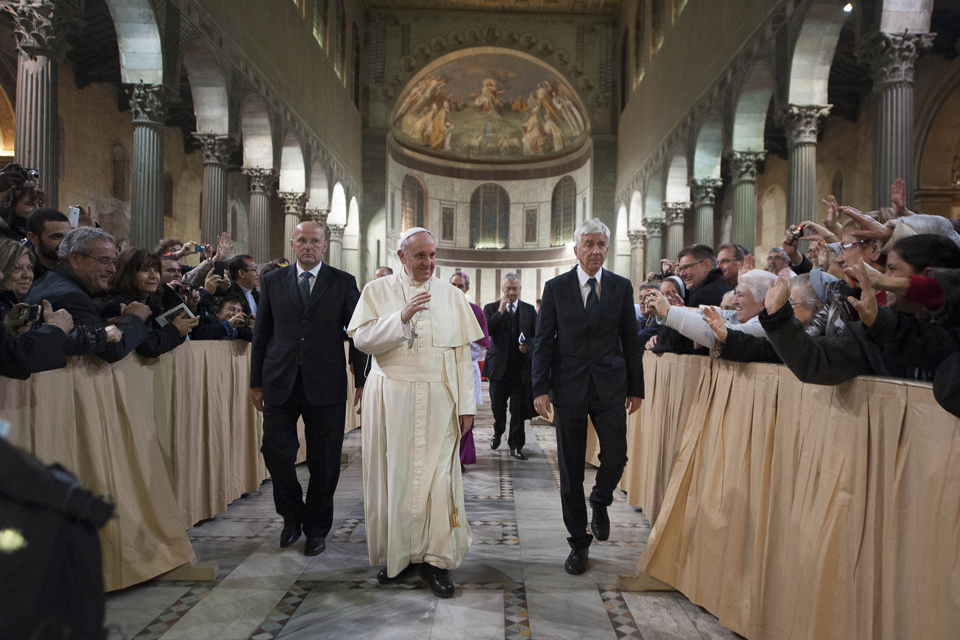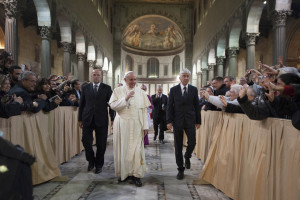

By Kaye Burnet | The Duquesne Duke
A recent Pew Research Center poll found that 8 in 10 American Catholics think favorably of Pope Francis, who has served nearly a year as leader of the church.
The poll results, released in February, show Francis to be almost as popular as the long-serving Pope John Paul II. Pew also reported that 7 in 10 American Catholics think Pope Francis is leading the Church in “a new direction.”
Over 50 percent think that the Church will change its position on homosexual unions, birth control and marriage for priests by 2050.
Director of Duquesne’s Center for the Catholic Intellectual Tradition Darlene Fozard Weaver said that while Francis brings a fresh approach to the Papacy, “he upholds Church teaching.”
“There are rather deliberate attempts in popular media…that want to pull on things that he has said to suggest that somehow he supports a reversal of Church teaching,” Fozard Weaver said, referring to a statement made by Francis during the summer.
Francis told reporters that if a homosexual person “searches for the Lord and has good will, who am I to judge?” Several media outlets, such as The Huffington Post, took this quote to mean that the Church was changing its position toward homosexuality, according to Fozard Weaver.
However, the Rev. Sean Hogan, executive vice president for student life, said Francis is committed to current Church teaching on controversial issues.
“So far from what I’ve read of Pope Francis, he hasn’t changed any doctrine,” Hogan said. “And, in my estimation, even the Pope can’t change the doctrine coming from Christ, but I think he’s taking a good approach to human problems that may be more pastoral than we’ve seen in the past.”
Weaver also said she thinks Francis is taking a new approach to papal leadership.
“He doesn’t simply preach the Gospel, he lives the Gospel,” Fozard Weaver said.
Fozard Weaver said the pontiff has lived out Christ’s example of humble servitude by driving a used car and living in a papal apartment in Vatican City, instead of the luxurious palace inhabited by previous popes. He has also washed the feet of Muslims on Holy Thursday and visited juvenile offenders in jail.
“I think that kind of leadership is incredibly attractive, because we don’t usually see much of it on behalf of people who are tasked with leading,” Fozard Weaver said.
For Hogan, Francis’ humility is his greatest strength as a leader, because it allows him to view each human person with love and respect.
“[Francis] strikes me as being genuinely interested in every human being. From the youngest baby to the oldest person to the prisoner in the jail, he seeks to come across to them as being interested in them as a person,” Hogan said.
Francis’ concern for the dignity of every person leads him to pay special attention to the poor, Fozard Weaver said.
According to Fozard Weaver, Francis’ compassion for the poor began before his ascendance to the papacy. While the cardinals were voting to elect the new pope and it seemed likely that Francis, then Jorge Bergoglio, was going to win, one of the Cardinals turned to him and said, “Remember the poor.”
“That message has shaped his papacy ever since,” Fozard Weaver said.
Even the pope’s decision to select the name Francis reflects his commitment to the poor, Fozard Weaver said, because St. Francis of Assisi had great humility and compassion for the poor.
According to Fozard Weaver, Americans need to take their love for Francis and channel it into greater service for the less fortunate. She also cautions American Catholics not to get too focused on issues of sexuality when there are millions of impoverished citizens of the world who need the love of Christ.
“American Catholics need to remember that the Church is a global Church. The agendas that are at the forefront of discussions in the Catholic Church in America are not the same issues that occupy the attention … of Catholics in other parts of the world,” Fozard Weaver said. “The most profound conversion to which Pope Francis repeatedly is calling members of the Church is to greater service for the poor.”




